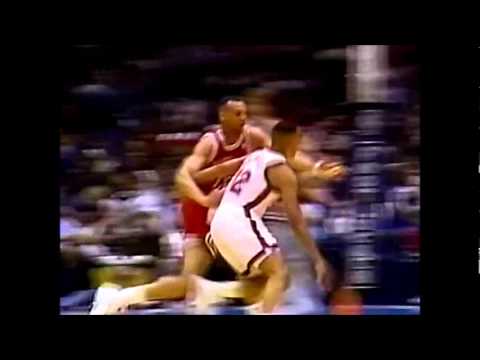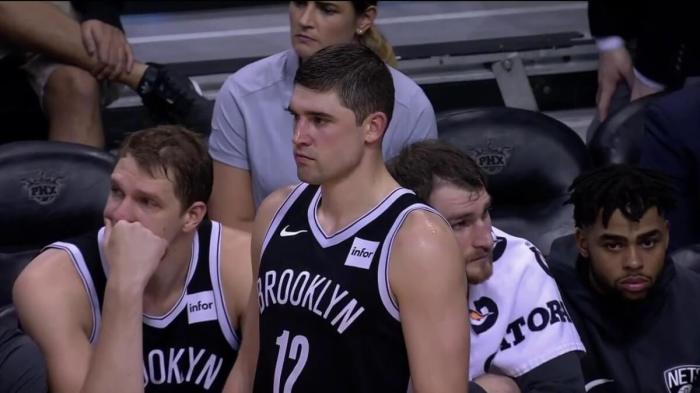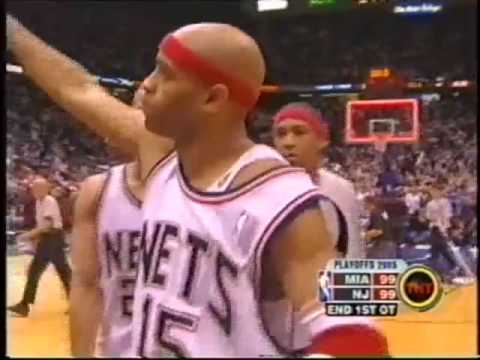
In this chapter of Nets Yearbook, I’ll be ranking the top 5 small forwards of Nets history.
5. Chris Morris
Regular Season (per game numbers in parenthesis): 510 G, 399 GS, 6,762 points (13.3), 2,918 rebounds (5.7), 1,015 assists (2.0), 784 steals (1.5), 468 blocks (0.9), .444 FG%, .307 3P%, .733 FT%, 15.3 PER
Playoffs: 13 G, 197 points (15.2), 74 rebounds (5.7), 19 assists (1.5), 20 steals (1.5), 18 blocks (1.4), .481 FG%, .283 3P%, .903 FT%, 19.5 PER
Morris was an average yet consistent small forward. The Nets used the fourth pick in the 1988 draft on Morris, and while he didn’t become a superstar, he did become a paragon of stability until he signed with Utah in 1995. Morris was a starter during most of his seven seasons in NJ and could be counted on for 10-15 points per game. Otherwise, he could rebound, shoot, and had a defensive rating of 106 (exactly average). However, he was most well-known as a dynamic high-flyer, participating in the 1989 dunk contest (placing last). He is also known for shattering the backboard against the Chicago Bulls in 1993.
4. Kendall Gill
(ed. note: I realize that Gill’s primary position was shooting guard, but in the interest of highlighting players worth a damn, we decided to list him at small forward. In retrospect, Erving should have been on this list at #1, and Gill should have been listed at shooting guard. -D.K.)
Regular Season: 331 G, 320 GS, 4,932 points (14.9), 1,591 rebounds (4.8), 981 assists (3.0), 652 steals (2.0), 186 blocks (0.6), .420 FG%, .297 3P%, .740 FT%, 15.9 PER
Playoffs: 3 G, 43 points (14.3), 13 rebounds (2.2), 3 assists (1.0), 4 steals (1.3), 1 block (0.3), .450 FG%, .875 FT%, 13.7 PER
Gill came to the “Crybaby” Nets roster in exchange for Kenny Anderson, who was originally trusted with the future of the Nets roster. However, despite such negative circumstances, Gill had a positive career with the Nets. He started in nearly all of the games he played with the team and even eclipsed the 20 points-per-game mark in the 96-97 season. Gill remained a positive influence on an otherwise morally compromised team before leaving to the Miami Heat before the 01-02 season. Horrible timing, Mr. Gill.
3. Bernard King
Regular Season: 193 G, 3,901 points (20.2), 1,496 rebounds (7.8), 506 assists (2.6), 251 steals (1.3), 78 blocks (0.4), .500 FG%, .286 3P%, .616 FT%, 17.5 PER
Playoffs: 5 G, 60 points (12.0), 12 rebounds (2.4), 7 assists (1.3), 5 steals (1.0), .510 FG%, .417 FT%, 15.0 PER
From a career standpoint, King is one of the most distinguished small forwards of all time. However, he only spent about 21/2 seasons with the Nets, thus his ranking is relatively low.
The Nets drafted King in 1977 with the seventh pick as a New York-based team. King had the best season of any Nets rookie ever in 77-78, averaging 24.2 points per game in 79 games. With this, he secured a spot on the NBA All-Rookie team in 1978. King played for the Nets in the 78-79 season once more and averaged 21.6 points per game, starting in all 82 games. However, the Nets ended up trading King to the Jazz the following season. King would finish out the twilight of his career in New Jersey but was no longer a model of perfect health and played in only 32 games.
Two fun facts:
1) As many of you may know, King scored 60 points for the Knicks against the Nets in 1984. Why is this fun? The Nets still beat their cross-river rivals by a score of 120-114.
2) King’s brother Albert King also played for the Nets.
2. Keith Van Horn
Regular Season: 314 G, 312 GS, 5,700 points (18.2), 2,398 rebounds (7.6), 575 assists (1.8), 274 steals (0.9), 200 blocks (0.6), .434 FG%, .346 3P%, .837 FT%, 16.9 PER
Playoffs: 23 G, 304 points (13.2), 142 rebounds (6.2), 42 assists (1.8), 19 steals (0.8), 9 blocks (0.4), .407 FG%, .430 3P%, .734 FT%, 14.4 PER
I’ll start by saying that Van Horn is generally considered a power forward first, and a small forward second. Other than reminding us that the five-position model is slowly becoming outdated, his perimeter play as well as his role on the 01-02 team as a small forward solidified this spot for him.
Van Horn is one of the more intriguing players in Nets history to me because he played for two Nets “eras:” the hope and decline era of the 90s, and the uplifting success of the early 2000s. The 76ers took Van Horn with the 2nd pick in the 1997 draft, but instantly traded him to the Nets in a mega-deal that also yielded Lucious Harris. Originally, Van Horn was the Nets best player, and led the 97-98 Nets into a three game sweep at the hands of the mighty Chicago Bulls.
In the end, the Nets recognized Van Horn for what he truly was: a player who could be the second or third option on a good team. Van Horn was the Robin to J-Kidd’s Batman, leading the team in rebounding and ranking second in scoring. In 2002, the Nets traded Van Horn in a hit-or-miss deal for Dikembe Mutombo.
His greatest highlight with the Nets? His game-winning three to beat the Celtics in the 2002 Eastern Conference Finals.
1. Richard Jefferson
Regular Season: 489 G, 417 GS, 8,507 points (17.4), 2,627 rebounds (5.4), 1,486 assists (3.0), 438 steals (0.9), 183 blocks (0.4), .475 FG%, .338 3P%, .777 FT%, 16.8 PER
Playoffs: 78 G, 1,181 points (15.1), 422 rebounds (5.4), 195 assists (2.5), 63 steals (0.8), 30 blocks (0.4), .474 FG%, .308 3P%, .738 FT%, 15.1 PER
RJ is one of the gems on Rod Thorn’s resume. Thorn made a phenomenal deal in trading for Jefferson on draft day, and Jefferson evolved from a sixth man to an All-Star caliber player. The third member of the vaunted mid-2000s Big Three, Jefferson was part of all six playoff runs during the Jason Kidd era, establishing himself as a legitimate third option on a championship-contending team.
The main thing that stood out to me about RJ was that he has been the only All-Star caliber player in the past 10 years who expressed explicit desire to play for the Nets. After getting traded, Jason Kidd, Vince Carter, even Devin Harris, all expressed joy about the next step. However, RJ was the only player to say that he was upset — hurt even — about his departure. Unfortunately, both the Nets and he ended up spiraling down after the trade. The Nets received Yi Jianlian and Bobby Simmons for him, and we all know how that worked out.
Jefferson has been on a steady decline since his departure, now limited to just corner threes and standard defensive responsibility with the San Antonio Spurs. His decline from a legitimate 20-point scorer to an inefficient and frustrated veteran has been sad to watch, to say the least. But to me, Jefferson will always remain as one of the greatest Nets ever, and I hope that the Nets raise his jersey into the rafters of Barclays Center.

















